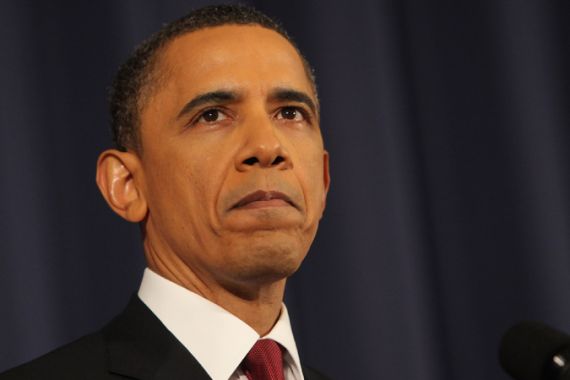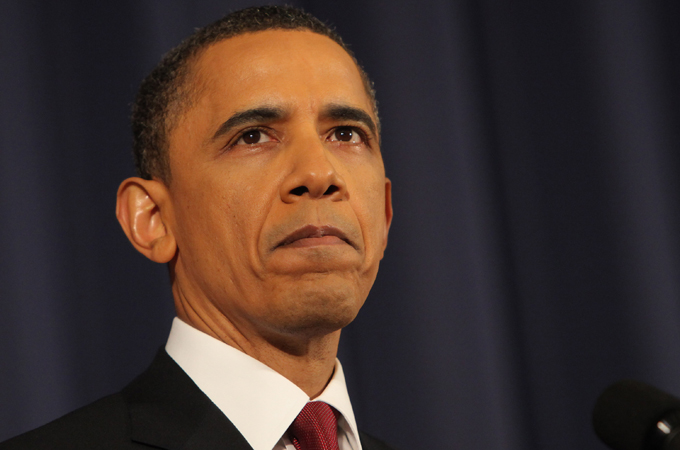Obama striving for post-imperialism
Barack Obama’s evolving Middle East policy signals a positive shift in US foreign policy, former CIA analyst says.

 |
| Obama’s speech last week demonstrated the president is beginning to outline a shift in the use of American power, Grenier says [GALLO/GETTY] |
Circulating at a charity event the other night, I happened upon an old friend, a senior official in the Obama administration.
During our conversation I mentioned, with some enthusiasm, the political changes taking place across the Arab Middle East. “Yes”, he replied. “I have seen what you’ve been writing”. There was nothing in his tone which suggested wholehearted approval.
One can understand his attitude. The fact is that I and others have been hard on the current administration. Speaking for myself, well before the Egyptian uprising, I was harshly critical of Obama’s apparent indifference to those attempting to promote democracy in Egypt.
Like others, I have long decried the fact that America has consistently pursued short-term interests in the region without giving due weight to our more fundamental long-term interest in encouraging democratic change. Obama, his idealistic rhetoric notwithstanding, has systematically conformed to that old, tired pattern.
After protests began in Tunisia and elsewhere, there were more reasons for complaint: about the US’s slowness to embrace movements whose guiding sentiments so closely echo our own history and stated values; about our apparent lack of faith in the moderating force of democracy; and about the extent to which America, by clinging to old paradigms, was willfully making itself irrelevant in a region traversing one of the great inflection points of its modern history.
Since then, as protests have spread to Yemen, to Syria, to Bahrain, to Jordan and, most compellingly, to Libya, President Obama’s approach has evolved considerably and encouragingly; and yet the complaints against him have, if anything, proliferated.
It seems to me that the time has come to give the president credit where credit is due. Obama’s speech of last Monday concerning Libya, even if not as rhetorically shimmering as some others, was nonetheless a masterful address.
It was thoughtful, it was nuanced and, most importantly, it provided a compelling rationale for the limited programme of action which the president has established for the US in that North African country. The speech was yet more important, however, for reasons having little to do with Libya per se.
For in the president’s words last week we can begin to see the outlines of a much broader program for the future use of American power. A president who clearly sees himself as a transformational figure is beginning to lay out the template for a post-imperial America.
For most of the last century, the United States has been an imperial power – imperial not in the sense of the colonial powers of the 19th and early 20th centuries, but in the “best” sense of the word: that is, as a power which sees its national interests in broad, and not narrow terms.
Nature, they say, abhors a vacuum, and history is no different. At the end of World War II, only the United States was in a position to exert the power necessary to block the global advance of a communist system which history has since shown to be both evil and pernicious.
Had America chosen to interpret its national interest more narrowly, recent history would have been far different – and not, I dare say, for the better.
Imperialism: overstretching responsibilities
Even since the fall of the Berlin Wall, America’s view of itself and its role in the world has not evolved appreciably. The challenges facing the global community may be far different now than 20 years ago, but the disproportionate role of the US in meeting them has changed little.
Former Secretary of State Dean Rusk best summed up the attitude over 40 years ago: “Other countries”, he said, “have interests. The United States has responsibilities”.
The process by which the United States has attempted to square its global responsibilities, as it sees them, with its “core” national interests over the years has been tortured, and anything but consistent.
The lack of clarity has caused many detractors of the US to refuse to accept that there might be a distinction between the two – a phenomenon seen in just the past few weeks, as some in the Arab world have again imputed purely self-interested motives to US actions in aid of Libyans.
Moreover, America’s conception of its imperial role, and the imperial mindset which accompanies it, has sometimes caused America to badly overreach, as it did in Vietnam, arguably did in Iraq, and may yet be doing in Afghanistan.
In a world of uncertainty, it is easy to overreach; overreaching becomes disaster, however, only when a nation refuses to accept the possibility of failure, and thus allows it goals to outstrip its means, its interests, and its responsibilities.
That is precisely what Obama refuses to do in Libya, and properly so. It is also worth remembering in this regard that the president’s initial instincts clearly impelled him in a direction different from the escalation he has undertaken in Afghanistan; coming years will witness his attempts to redress that mistake.
Obama now presides over a country badly over-stretched in its engagements abroad and in its fiscal arrangements at home. No longer able to sustain the role it assumed after World War II, it must somehow recalibrate both ends and means, both within its shores and beyond, before its current discomforts are transformed into a genuine decline.
Libya policy
Obama has yet to fully articulate his vision of America’s global role outside of particular cases, as most recently with Libya. Even in Libya, there is an ambiguous, aspirational quality to what the president proposes, for to do what he intends will depend in part on the cooperation of those whom he cannot control at least as much as on actions he can take himself.
Just look at the multifarious complaints about his Libya policy. Many in the US decry the limitations which the president is attempting to impose on the US role there, and cannot understand why is willing – indeed, determined – to subordinate US power to foreigners, including the French, no less.
Others cannot comprehend how a US president can declare Gaddafi’s political demise a goal of US policy, and yet neither champion a policy nor devote the resources necessary to guarantee that outcome.
To them, for the President to desire a thing – remember the imperial mindset – and fail to achieve it is simply unacceptable, whether core interests are involved or not.
Still others brand Obama’s policy toward Libya as hypocritical: How can he support intervention to defend Libyans from oppression while tolerating repression in Bahrain?
Such critics are as much supporters of American imperialism as the most jingoistic Republican. The only difference is the ends to which they wish to see American power devoted, and their willful refusal to take account of competing interests.
No, President Obama will not be able to effect America’s transition to a post-imperial future on his own, and the impediments to his desires will by no means be exclusively domestic.
Many in the global community, while they might refuse to admit it, will be loathe to support or facilitate such a change, for many are more than happy to see the robust use of American power when it suits them, and are generally loathe to assume broader responsibilities themselves.
Indeed, it is unlikely that the US will be able to shed costs and responsibilities to the extent the US president would like, even in Libya.
It is not clear to what extent the US president’s thinking has crystallised into what might eventually become an Obama Doctrine. More likely, he is exercising his instincts in response to issues as they come.
Indeed, we will soon see his strategic proclivities again revealed in the looming controversy over the promised American troop-drawdown in Afghanistan.
In any case, it is unlikely that the president will soon articulate a detailed and comprehensive philosophy of the global use of American power, mostly because it is beyond the power of this or any president to achieve such sweeping change quickly.
Still, the President made a good start last Monday, in a speech that was supposed to be about Libya. We should give him credit for that.
Robert Grenier is a retired, 27-year veteran of the CIA’s Clandestine Service. He was Director of the CIA’s Counter-Terrorism Centre from 2004 to 2006.
The views expressed in this article are the author’s own and do not necessarily reflect Al Jazeera’s editorial policy.
